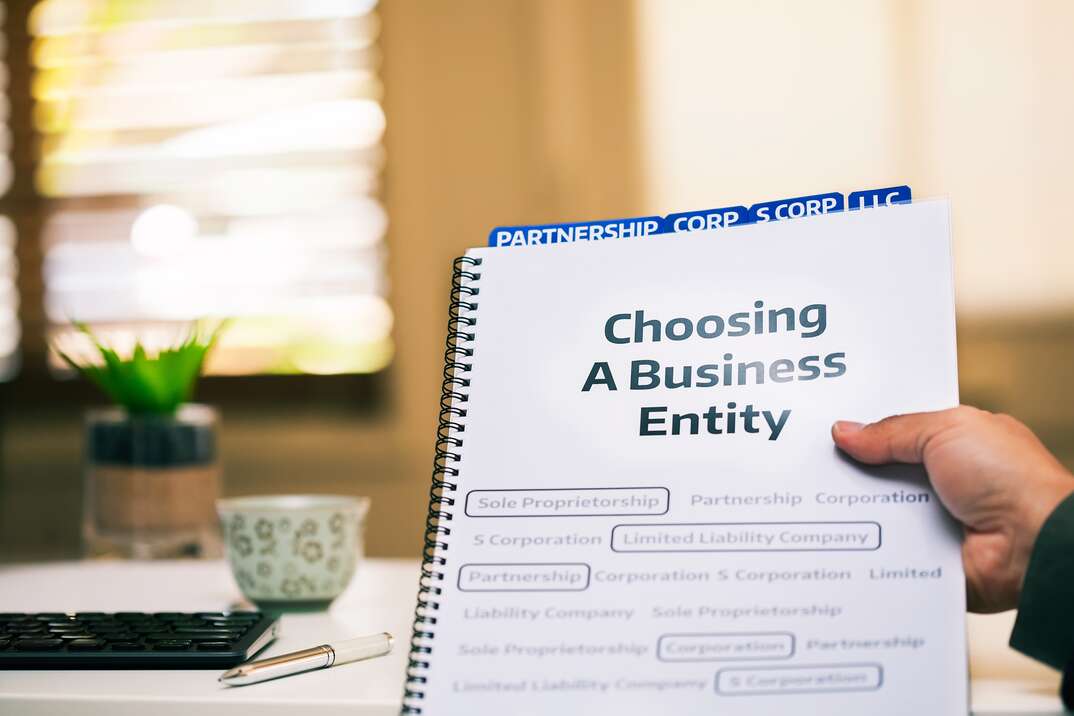- AppliancesElectriciansHVACLandscapingLocksmithPest ControlPlumbingRenovationRoofingT V RepairAll Home Improvement
- Car AccidentClass ActionCorporate LawCriminal DefenseDivorce LawEmployment LawFamily LawFinancial LawLegal AidMedical Injury LawyersMedical MalpracticeReal Estate LawWater Fire RestorationAll Legal
- InvestmentRetirementAll Finance
- Animal InsuranceAutoGeneral InsuranceHealth PolicyHome RentersAll Insurance
- DentalHealth SpecialistsAll Medical
- Animal CareVeterinaryAll Pets
- Auto GlassTowingAll Automotive
Entrepreneurs, Here Are 4 Business Structures to Know About

Whether you're manufacturing dog toys, mowing lawns or selling accounting software, it's important to set up your business correctly. The structure you choose affects everything from how much tax your company pays to how much personal liability you have, so you need to get it right.
A sole proprietorship is an unregistered business operated by one person. For example, if you offer freelance writing services to marketing agencies, you may do so under your own name instead of setting up a formal company.
The main advantage of a sole proprietorship is that it's easy to set up. You don't need much money to get started, and there isn't a lot of complicated paperwork to complete. Additionally, you can use your profits as personal income instead of filing a separate business tax return.
One of the biggest disadvantages of a sole proprietorship is that you're personally liable for all business obligations. For example, if you take out a personal loan to buy equipment, the bank can sue you personally if you don't repay the loan as agreed. A customer may even sue you for making a mistake.
Partnership
If you want to start a business with another person, you have the option of creating a partnership, or a formal arrangement between at least two people. Partnership is a broad term that encompasses two business structures: limited partnerships and limited liability partnerships.
Limited partnerships have one partner with unlimited liability. The other partners have limited liability. In contrast, all partners in a limited liability partnership have limited liability, giving them additional protection. One of the major advantages of partnerships is that they're fairly easy to start. Creating a partnership also gives you an opportunity to test a business idea before committing to a corporation or limited liability company.
A major drawback of the partnership structure is that every partner shares some of the liability. If your partner makes an unwise decision, it can come back to haunt you, even if you had no knowledge of their activities. When you're in a partnership, you also have to seek input from other partners before making decisions, giving you less autonomy.
The limited liability company (LLC) is one of the most popular business structures due to the amount of protection it provides. An LLC is a separate legal entity, so members generally aren't held responsible for business debts. For example, if your LLC takes out a loan and can't pay it back, you don't become personally responsible for the amount owed.
LLC members also benefit from "pass-through" taxation. In other words, the income passes to the members, so there's no need to file a separate business tax return. An LLC also has fewer requirements to meet at the state level, making it simpler than an S corp or a C corp.
The main drawback of forming an LLC is that it costs more. In addition to the formation fee, you may have to meet quarterly or annual filing requirements, increasing the cost of legal and accounting services for your business.
More Related Articles:
- When Do You Need a Lawyer? Determine If You Need to Hire an Attorney
- How Much Are Court Costs?
- What Is a Misdemeanor?
- What Is Legal Precedent?
- How Do You Fire Your Attorney?
Corporation
A corporation is an organization that's authorized to act as a single entity. Under IRS rules, a corporation is treated as a C corp unless it elects a special tax status. Corporations with this tax status are known as S corps. Both types of businesses offer limited personal liability for the owners. C corps and S corps must also meet strict requirements regarding legal compliance.
C Corp vs. S Corp: Major Differences
The main difference between a C corp and an S corp has to do with taxation. Like an LLC, an S corp offers the benefit of pass-through taxation. Although S corps must file federal tax returns, they don't pay federal income taxes at the business level. Instead, the income passes through to the owners. Once an owner receives their S corp income, they pay personal income taxes on it.
In contrast, a C corporation pays taxes at the business level. For example, if the owner of Worldwide Widgets chooses the C corp structure, Worldwide Widgets has to file a tax return and pay taxes on its income. The owner files a separate tax return with their personal income on it.
One of the biggest drawbacks of the C corp structure is the potential for double taxation on dividends. The company has to pay taxes at the corporate level, and then its shareholders must pay personal income tax on any dividends they receive.
Elocal Editorial Content is for educational and entertainment purposes only. The information provided on this site is not legal advice, and no attorney-client or confidential relationship is formed by use of the Editorial Content. We are not a law firm or a substitute for an attorney or law firm. We cannot provide advice, explanation, opinion, or recommendation about possible legal rights, remedies, defenses, options or strategies. The opinions, beliefs and viewpoints expressed by the eLocal Editorial Team and other third-party content providers do not necessarily reflect the opinions, beliefs and viewpoints of eLocal or its affiliate companies. Use of the Blog is subject to the
Website Terms and Conditions.The eLocal Editorial Team operates independently of eLocal USA's marketing and sales decisions.



